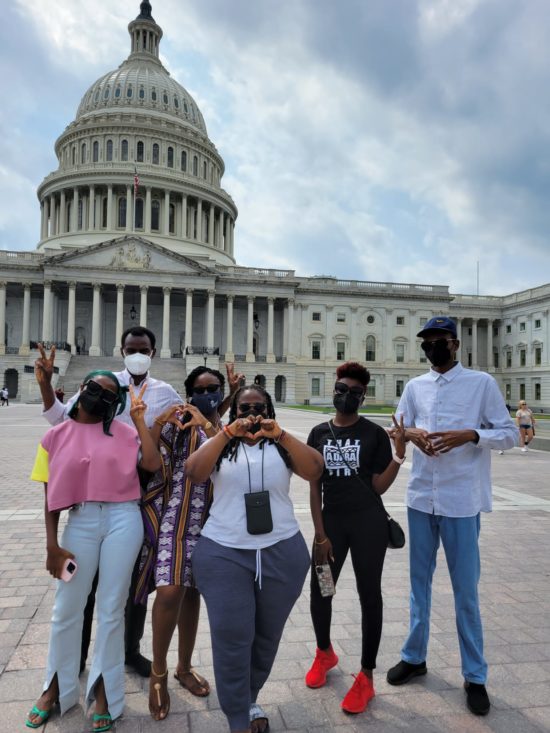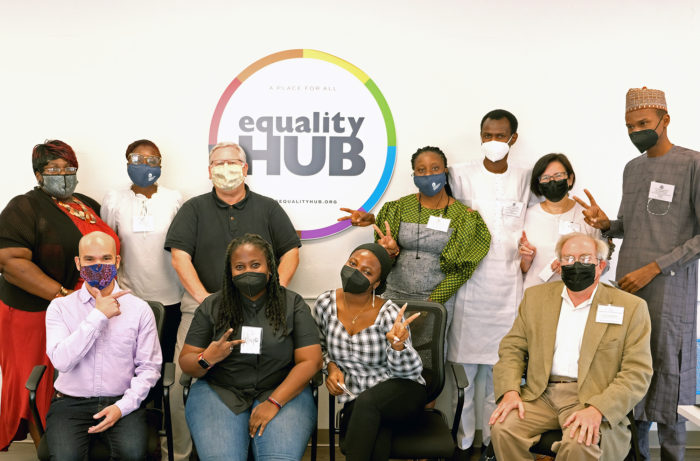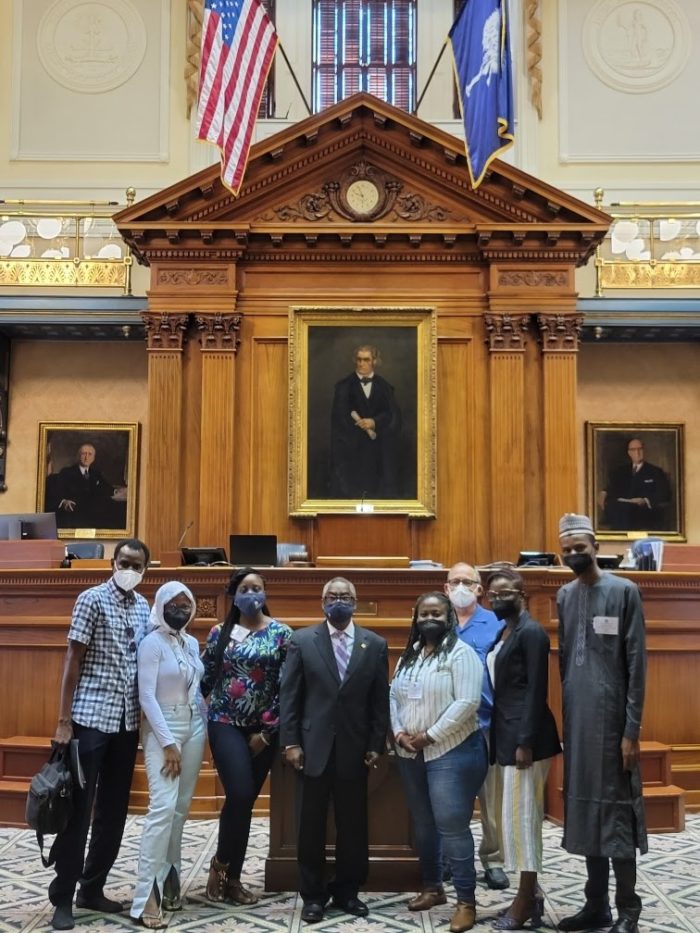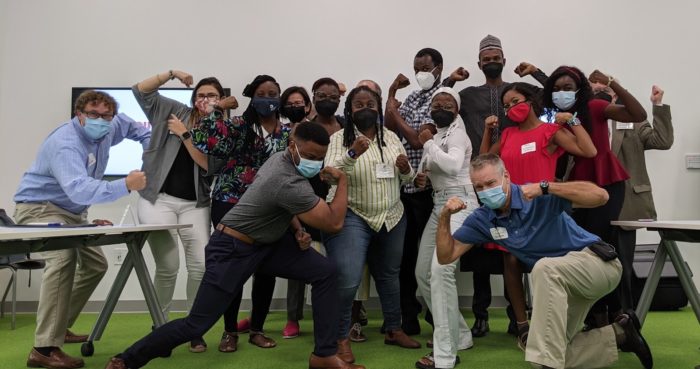Editor’s note: For three weeks in late July and early August, members of the Global Ties Network hosted the first in-person International Visitor Leadership Program (IVLP) since the COVID-19 pandemic. The project was organized by World Learning, in collaboration with the Charleston Council for International Visitors, Columbia Council for Internationals, and Georgia Council for International Visitors. Read below for highlights from the exchange, and lessons learned to incorporate virtual programming into hybrid and in-person projects moving forward.
A Meaningful Experience: Reflections on the Pilot In-Person IVLP
World Learning

The IVLP participants enjoy a visit to the U.S. Capitol in Washington, DC. Photo provided by Lisa Bennett
World Learning had the privilege to implement the first in-person pilot International Visitor Leadership Program (IVLP) project to launch since the global pandemic began. This three-week single-country project for Nigeria, titled “Human Rights and Civic Engagement for Youth,” included four distinct city stops: Washington, DC; Charleston, SC; Columbia, SC; and Atlanta, GA.
Six international visitors participated in this project. They included activists and changemakers working to empower marginalized communities, advance LGBTQ+ rights, end state-sanctioned violence, and draw attention to human rights abuses using the tools of social media. Two international visitor liaisons accompanied the group throughout the project. Overall, the nature of this group – their openness and eagerness to make the most of their journey – allowed for a very meaningful experience, despite the difficult circumstances.
– Lisa Bennett, Team Manager IVLP
Charleston Council for International Visitors
In late July, the Charleston Council for International Visitors (CCIV) hosted the U.S. Department of State’s first in-person International Visitor Leadership Program (IVLP) project in more than 16 months as one of three city stops. Visitors from Nigeria met with Charleston-area LGBTQI+ advocacy organizations, faith-based social justice collaboratives, and police advisory councils in alignment with the project theme, “Human Rights and Civic Engagement for Youth.”
In a meeting with leadership from the local LGBTQI+ organizations Alliance for Full Acceptance, We are Family, and Charleston Black Pride, international visitors held a frank discussion of regional differences in attitudes and stigmas faced by LGBTQI+ Nigerians. Several participants noted they had improved their understanding of how different communities within their country – e.g. urban or rural, western or eastern – posed different challenges for LGBTQI+ advocates.

International visitors meet with a panel of LGBTQI+ advocates in Charleston, SC. Photo provided by Noah Koubenec
Charleston was also able to host the visitors for home hospitality, and fully-vaccinated hosts were delighted to welcome guests in-person after more than a dozen virtual home hospitality sessions. One international visitor, a competitive chess player in Nigeria, gave one of her young hosts an introductory lesson.
Of course, the visit did require a number of logistical arrangements unique to COVID-19. New considerations included planning for the possibility of a positive test while in Charleston (which required identifying hotels suitable for extended quarantine stays), as well as adjusting professional and cultural appointments and home hospitality.
For professional appointments and cultural events, this meant masks were worn by attendees at all meetings and, where possible, larger spaces were used to allow for distancing. COVID precautions also informed decisions on cultural events: outdoor or semi-outdoor options such as open-air harbor cruises were strongly preferred. A Gullah Geechee driving tour was also scheduled, which required fully booking the vehicle to keep program participants as isolated as possible given the increased transmission risk of enclosed vehicles.
The IVLP project offered nuanced personal and professional interactions and a sense of connection. CCIV was thrilled to have a role in reviving in-person citizen diplomacy.
– Noah Koubenec, Assistant Director for Fellowships, Office of Study Abroad, International, and Domestic Programs

State Senator John Scott Jr. with the IVLP contingent at the State House of South Carolina. Photo provided by Sewell Gelberd
Columbia Council for Internationals
Columbia Council for Internationals (CCFI) was fortunate to be included in the first International Visitor Leadership Program (IVLP) in-person group in 16 months. This was my first in-person program, and I was very fortunate to work with two experienced, professional liaisons and six lively, engaged, and personable Nigerian visitors on the IVLP project “Human Rights and Civic Engagement in Youth.”
This in-person program went extremely well. With safety as a priority, mask protocols were adhered to at all times — we were very careful to ensure everyone with whom they interacted wore masks — and all participants tested negative prior to their return flight home.
Another suggestion to further minimize the risk of visitors’ exposure to COVID-19 might be to plan to eat all meals outdoors, or on the bus. Since masks must be removed when eating, exposure in restaurants, particularly at lunchtimes, can be reduced.

The international visitors and representatives from Youth Corps. Photo provided by Sewell Gelberd
The group photo (pictured above) was taken at the end of my favorite part of their visit at the Youth Corps, an organization that houses a one-year experiential learning program for high school students in the tenth and eleventh grades. The interactive session was enthusiastically led by Youth Corps staff and alumni. After a very lively ice-breaker, the staff and alumni shared their experiences with each of the program’s nine monthly, themed modules, which includes topics such as community service and the arts. These modules were presented to the group with experiential exercises that fully engaged all the participants. In fact, the participants had so many questions, we finally had to end the session in order to get them to their next stop.
CCFI sponsored a home hospitality event that I hosted at my house that evening, attended by a number of CCFI Board members and some of the program participants. I was honored to have this dynamic group in my home, and the event could only be judged a big success. Hosting IVLP groups in-person again is a reminder of the power of face-to-face connection.
– Sewell Gelberd, Program Director for International Visitors
Georgia Council for International Visitors
In August, Georgia Council for International Visitors (GCIV) had the privilege to welcome the first in-person International Visitor Leadership Program (IVLP) group in 16+ months, since the beginning of the pandemic. One of the biggest hurdles we faced was the new COVID-19 protocols and testing. This was completely new and something that we had to learn how to implement. Luckily for us, we were the last city stop in their IVLP program and were fortunate to learn some lessons from the DC and other cities on some of the challenges with testing. We chose an urgent care for testing because they allowed us to schedule appointments and provided us with an account manager to streamline any issues and paperwork.
The in-person meetings were held in a large conference room at their hotel which allowed for social distancing. They also were able to enjoy walking tours of the Martin Luther King, Jr. National Historic Park and the Center for Civil and Human Rights.
We were very fortunate that our community was ready and willing to participate in the program. Although navigating back to in-person is challenging, it was great to be able to see visitors explore and enjoy Atlanta again. We cannot wait until we are able to again host visitors in-person.
– Emily Shaw, Executive Director and Sarah Weigle, Program Coordinator

The IVLP participants take a group photo in front of a mural at the National Center for Civil and Human Rights in Atlanta, GA. Photo provided by Sarah Weigle
The Best of Virtual: IVLP Virtual and Hybrid Program Applications
World Learning
Even though this project was in-person, virtual programming remained a central component due to current CDC quarantine guidelines. World Learning arranged a full week of virtual sessions that responded to participants’ professional interests, fostered group networking and cohesion, and supported participants’ well-being. We maintained the best of virtual, integrating the lessons learned over the last 16 months as we implemented this all-virtual quarantine week.
A few elements to highlight include:
- Maintaining a technology orientation to ensure visitor connectivity on personal devices, test the hotel internet bandwidth, and help prepare the group for their virtual week;
- Inclusion of CBMs during the virtual project opening to introduce their city and program;
- A dedicated session focused on “Coping with Quarantine,” which introduced the visitors to simple stress-reduction and mindfulness techniques to support their well-being;
- An alumni networking event, which allowed IVLP alumni to share tips and considerations on how to maximize the exchange experience, while also starting to build in-country connections;
- A group sharing session facilitated by the liaisons, which highlighted takeaways from the virtual week and aspects the visitors hoped to see in upcoming city stops, and offered the opportunity to re-enforce in-person requirements around health and safety; and
- Inclusion of a virtual project closing to help gather evidence of effectiveness.
The lessons learned from this project are many. Among them, we found that participants experienced Zoom fatigue and, while they appreciated the richness of the virtual program, needed time for themselves. From this experience, we recommend maintaining the three meetings a day guidance, even during an all-virtual week. Additionally, given the substantial lift of the virtual week, World Learning recommends engaging the CBM network to support during this part of the program. Even if your community or organization is not ready to receive in-person projects, this is a great way for you to participate!
– Lisa Bennett, Team Manager IVLP
Georgia Council for International Visitors
During this program, virtual programming was incorporated in the opening and during their first week in Washington, DC while they were quarantined. They also participated in a virtual closing while in Atlanta, GA. I believe virtual programming will continue to support in-person projects though allowing CBMs to be a part of openings, as well as for meetings that are not geographically close. We program for the whole state of Georgia and virtual programming will allow us to incorporate resources that are not geographically close to Atlanta.
– Emily Shaw, Executive Director and Sarah Weigle, Program Coordinator
Columbia Council for Internationals
The experience showed us ways in which we can incorporate virtual technologies with in-person exchanges. For example, we could have avoided a slightly-rushed morning on the last day of their short visit by doing the final program on the Preservation of Historical Civil Rights Monuments as a virtual meeting, rather than in-person. The presentation was mostly of slides and photos; a lesson learned for future visits.
– Sewell Gelberd, Program Director for International Visitors
Charleston Council for International Visitors
CCIV staff see potential for using virtual programming to supplement in-person programming on a growing number of projects in the future. Virtual appointments can help overcome the scheduling challenges introduced by longer travel times given that for the immediate future domestic air travel will not permitted for in-person IVLP projects, they can be helpful for meetings with organizations which cannot easily meet in a central location, and they may be ideal for appointments focused on virtual or online resources. For international visitors, hybrid programs may help to increase access to IVLP given reduced demands on time and disruption to professional or personal obligations.
– Noah Koubenec, Assistant Director for Fellowships, Office of Study Abroad, International, and Domestic Programs
